One of the arguments I sometimes hear is that the role of marketing technologists has a limited future because, eventually, every marketer will be a marketing technologist.
I’m usually skeptical of those assertions because I know so many marketing technologists who have deep technical skills — such as systems architecture and software engineering — that (1) take a significant investment to acquire and (2) don’t seem necessary for most marketers to possess.
I’m a big advocate of having people with technical depth on the marketing team, but I don’t believe that everyone on the marketing team needs to be a hardcore technologist.
But not all marketing technologists are equal in their technical talents. Many of them are mostly adept at learning and operating more advanced marketing software, such as complex marketing automation platforms and big web experience management systems. They know how to piece together multiple components into a marketing stack. And they can do some lightweight programming with scripts and HTML. But that’s usually where their tech skills taper off.
That’s not to downplay the importance of those marketing technologists — they are immensely valuable in today’s marketing environment and in high demand.
But I also agree that the baseline skills for someone with the “marketer” title in general must continue to rise. Eventually, most marketers should be able to evaluate, configure, and operate a wide set of marketing technology. They should be able to “think programmatically” — since more and more marketing will be programmatic in nature. And, as marketing software improves, it will make more advanced capabilities more accessible to less specialized users.
This does not mean that marketing technologist skills are going to fade in importance. Quite the opposite: marketing technologist skills will become a requisite baseline for working in marketing.
Now, two caveats to this:
First, we’re not there yet — and won’t be for a while. I would estimate that this “reunification” of marketing technologist skills into the baseline requirements of being a modern marketer as being at least 5 years away. Of course, there will be many individuals who blend those skills in ahead of the curve — and that will be highly advantageous to their careers. But on the visible horizon, marketing technology management is still a specialized capability.
Second, even after “reunification” there will be ongoing technology specialization. While many tasks that require a marketing technologist today will be doable by baseline marketers, there will still be a set of more advanced technical work that will require more specialized skills. I’m primarily thinking of software engineering, which I believe will continue to be a profession that will demand deep technical expertise beyond what most marketers will want or need to acquire. But I think the need for software engineering will be entwined with marketing’s mission in a digital world for the foreseeable future.
This brings me to the graph at the top of this post.
This predicted phenomenon — of marketing technologists being a temporary specialization that largely regresses back to the mean of what defines a “marketer” — seems analogous to the pattern we’ve seen with digital marketing and, possibly, what we’re seeing with growth hacking too.
For a while, digital marketers were specialists that raced ahead of baseline marketers with their unique knowledge and domain expertise. But today — even though we’re not there completely — we see the reunification of digital marketing into the standard definition of marketing. Digital marketing is just an implicit part of marketing now.
Although, important to note, it took 20 years.
I also suspect this is the pattern that we will see with “growth hacking.” I realize that may be controversial, as many growth hackers feel they are more than marketers and bring a very different viewpoint and skill set to bear. And today, that’s absolutely true. But as the world becomes more and more digital, it seems like marketing has only one place to go: marketing will be responsible for customer experiences that grow the business. And they will absorb the skills and mindset of the growth hacker in their quest to achieve that.
In both cases, the skills don’t go away. Digital marketing skills are essential for every marketer to have today. Growth hacking skills will be essential for every marketer to have in the future. And those pioneers who are ahead of that curve — they’ve got a powerful edge that’s great for their careers.
The difference with marketing technologists, however, is I believe there will continue to be an ongoing specialization for those with advanced technical capabilities — above and beyond tech-savvy baseline marketers. But they will be true specialists.
However, I don’t think anyone sees a future for ongoing specialization for “digital marketing” though — after reunification, that evolutionary branch will no longer be separate.
My sense is that “growth hackers” won’t persist as a specialization either. Again, that’s not to say that the growth hacker movement is going away — growth hackers will become the new de facto marketers. Whether marketing is conquered by growth hackers or growth hackers are assimilated into marketing is an inconsequential distinction that will only matter to the people who make it happen.
But maybe growth hackers, like marketing technologists, will evolve further specialization. In fact, maybe those two branches merge in their specialization, circa 2020?
Now that I think about it, I think we’re seeing this same pattern play out with data scientists in marketing too. And like marketing technologists, I think there will be an ongoing specialization there too — but the majority of the tasks that we allocate to data scientists today will become baseline capabilities of marketers in general.
What do you think?
Thanks to Kaila Colbin for her great article on marketers and growth hackers that catalyzed my thinking on this.
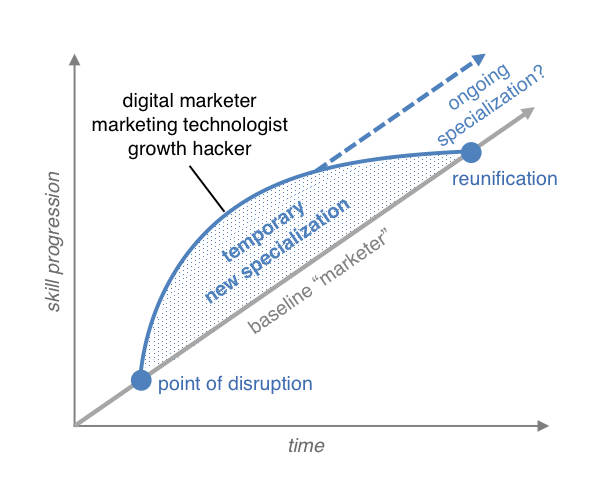
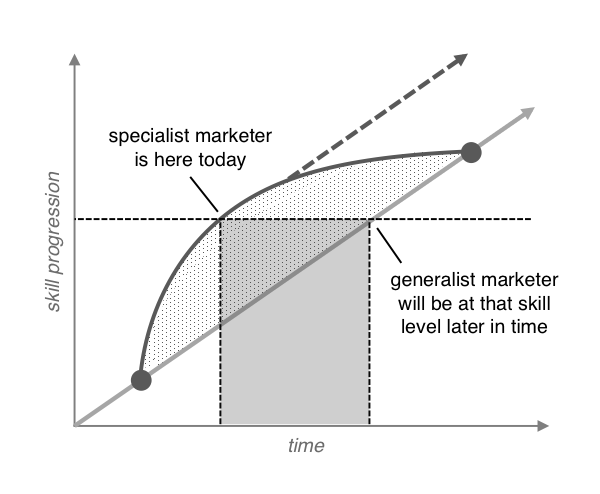
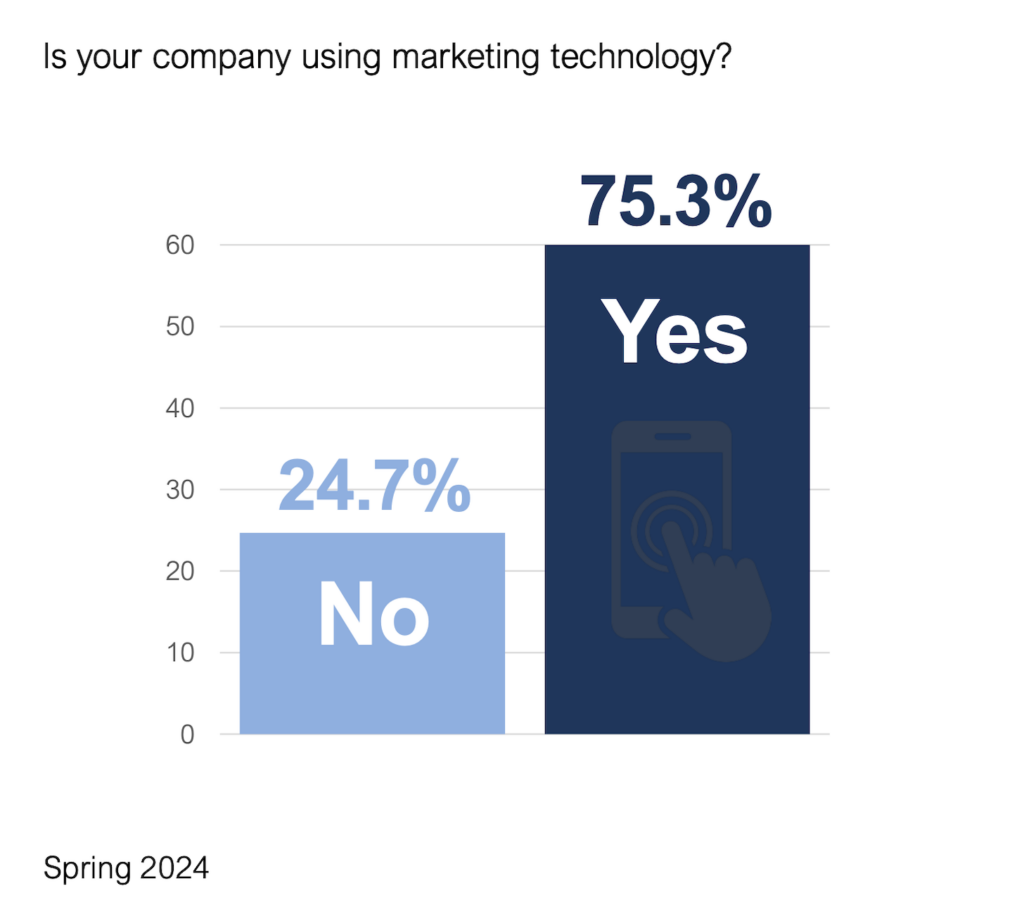
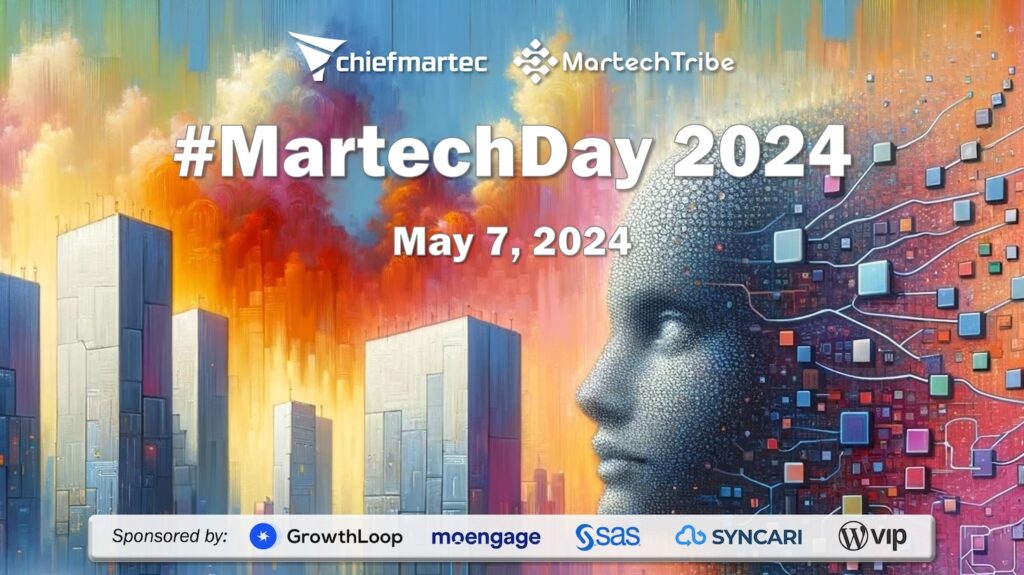
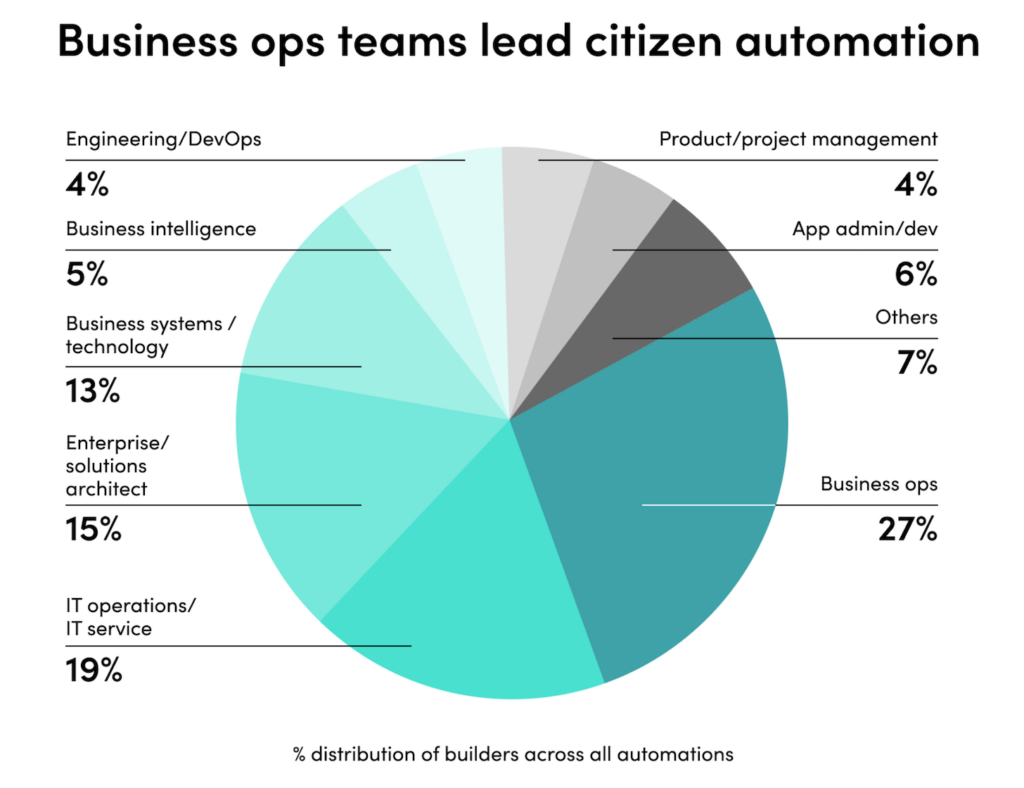
Scott, what kind of tasks do you think “we allocate to data scientists today will become baseline marketer skills?” Are there a few specific tasks you’re considering?
Hi, Alex.
I’m mostly thinking of finding patterns in large data sets and building models for prediction.
We’re seeing some of this absorbed into marketing software, which makes it more accessible to non-specialists. But in a lot of environments, there’s still a lot of skills needed to bring together disparate data sets, scrub them, extract meaning, and apply good statistical thinking throughout.
But good data skills seem like a likely candidate for being absorbed into baseline marketer capabilities.
Thanks for clarifying, Scott.
I do believe it’s important to distinguish the difference between realizing patterns in data and building models for prediction. As I see it, the former can be achieved by today’s marketers, but the latter cannot. At least not yet.
There are certainly some great tools on the market today that are helping to democratize analytics—for example, Lattice Engines’ predictive scoring and identification capabilities, or Tableau’s data exploration and business intelligence capabilities. However, we’re not yet at a point—and might not be for some time—where a marketer can actually build a predictive model (at least not a net-new, advanced predictive model—and perform all the tweaks that are necessary to make the model most effective). And really, we might not ever be at a point where a non-specialized “baseline” marketer builds predictive models. Nodding back to your point in the article about the need for marketing having specialists—this is one very likely future specialist role: marketing data science/analytics.
I’ve been playing in both the marketing and data science sandboxes for several years now, and I believe it’s important to continue to educate people on the differences between concepts like business intelligence/reporting (e.g., finding patterns in data) and advanced analytics (e.g., regression modeling). The two dynamics are definitely converging, but there’s still enough difference to consider them separately.
Most importantly, the best marketers will learn to work very closely with tools that can effectively analyze data, while also partnering very closely with their analysts and data scientists. Marketers know the right questions to ask (domain expertise); the data can help them answer their questions. When the two of these things converge, the real magic happens.
Very interesting point – the definition of the roles would not be clear for a while. It explains some of situations that I experienced in my past (at one point I was moved to IT as I was the only marketer in the group knowledgeable in digital marketing – both IT and I protested, because all I knew was HTML 😉 ).
From another side, I think we will see more specialization, as it is not possible for most of us to keep up with automation, SEO, analytics, email, testing methodologies, and everything what comes next. Too much to monitor and practice to be minimally effective.
However, the basic understanding of expanded world of marketing will, hopefully, be more common. This would be very encouraging trend. I changed jobs relatively recently, and I was thrilled with improved level of understanding of “modern marketing,” including automation and analytics, among senior marketers – even in large organizations.
Thanks, Vanessa.
Good point. I agree, my “baseline marketer” line doesn’t do justice to the many kinds of specialization that will still exist within marketing. In addition to skills specialization, larger marketing teams will also need some sort of organizational structure, which will inevitably result in some organizational specialization too.
Scott, you are absolutely right about the time and effort goes into truly becoming an expert in systems architecture and software engineering. This is a prime area that marketing technologist should be expert in. Marketing technologist is not about just buying a suite of products and enabling digital marketing.
One of the biggest challenge that a marketing technologist has is to understand the ecosystem of IT, BT that are existing in the company; then understand the marketing needs and solutions available outside before plotting all things together to create a marketing technology ecosystem. Beyond all the soft skills, this needs strong system architecture skills which I never learnt from a college degree or reading books but from years of practice.
I experience the benefits of the system architecture knowledge on a daily basis as I work on creating the next generation marketing technology platform with my business , IT and vendor teams.
I do feel that marketing technologist is a role that may disappear if main vendors are successful in creating a truly functional and seamless integration between all martech solution categories on your landscape. Which is not happening soon!
Thanks, Rohit.
You’re one of the marketing technology wizards that I have in mind when I picture why “marketing technologist” is a valid — and highly valuable — specialization today. Systems architecture for marketing needs to get done, and it is best served by people who understand both the systems side and the marketing side.
The baseline of tech-savviness for non-specialized marketers will rise, and yes, improvements in software will empower those non-specialists more. But both of those things are going to take a while. And I still think more advanced technical specialization will remain.
The next five years will be the golden age of the marketing technologist.
I am becoming concerned that we are starting to confuse the means with the end.
All the digital tools and Martech solutions will not save you if the product does not deliver value, the market is not ready, you get the positioning wrong, and all the other things successful marketers have done well in the past.
The Martech stack, and tools are just that, Tools.
You still need those who understand when you need a screwdriver, and when a hammer will work best.
Some of the youngsters I see coming through (although to me, anyone under 40 is rapidly becoming a “youngster”) seem to think the basics are less relevant than they were.
To my mind they are even more relevant because of the leverage offered by the digital tools.
I agree with you 100%.
Marketing technology skills, digital marketing skills, growth hacking skills, data science skills, etc., and all their relevant tools, are means to an end. The real value of marketers will always be their ability to influence and champion customers.
As Mayur Gupta would say, #HumanFirst.
Whilst the sentiment may not go down well on this site, I do wonder if the role of Marketing Technologist will become redundant in time.
As software becomes more complex it should also become more simple for the end-user. Simple integration (like Zapier) to tie systems together. New Big Data technology that can intelligently structure and join any data we throw at it. Artificial intelligence to segment data and find insights (IBM Watson).
Once these features become a reality, the need for an internal marketing technologist may evaporate.
Hi, David.
Actually, I mostly agree with you — I see a chunk of what will be the “marketing technologist” specialization over the next 5 years eventually being reunified into baseline marketer skills.
I do think there will still be a path for specialization beyond that, for more advanced technical capabilities. But training, software, and expectations will all advance to raise the net technical strengths of baseline marketers.
However, as a footnote to that…
I can imagine a world where software is so powerful and so easy that it turns any and every marketer into a technology-powered superhero, with no one technical in the loop selecting, integrating, configuring, operating, or extending it.
But when will that happen? It’s not reality today, at least for most businesses with any real scale in their marketing. And while it’s hard to predict the future, my best guess is that we’re at least 5 years away from that — if for no other reason, because we are still seeing so much disruptive innovation in the space that will take a while to settle down (if it ever does?).
So if you’re running a business now, and responsible for results this year, next year, and the year beyond that, I think you still want to have the talent on your team — or extended team — to master the reality of marketing technology today.
Great article! Technology savviness will be a core competency for marketers, yes. While we as marketers need to understand tech, there is also room to be a great storyteller of tech. As it is important to have someone who can see potential with technology, know how to leverage the technology, how to implement, etc. It is also important to have someone who can communicate the value of the technology. Otherwise you invest in smart tech but don’t have the right use case, will it live long within your organization? Maybe for those who can’t code, we can become really great explainers 🙂
Love this comment, Corey. Being a great communicator (or “storyteller”) is actually more important than most people realize. In fact, I just finished a graduate degree in data science, and the program I was in is now formally considering a dedicated class on teaching analytics professionals how to be great communicators, too.
Thank you for sharing this Scott!
“…marketing will be responsible for customer experiences that grow the business…” is the most important phrase I find.
But the more digital the world becomes, the more important the attitude and behavior of people is in crafting the right customer experience. Training and development is traditionally an HR job. Will marketing and HR collaborate more? Training and development based on marketing insights? How do you see this? Thank you.
Yes! For many reasons — partly the mission of customer experience, which requires greater empathy with the audience, and partly because the technology gives individual marketers greater leverage — talent development will be the key factor in marketing’s success.
Talent, culture, and “organizational capital” are the competitive advantages in that world.
Scott –
There may be a parallel here worth considering…
Marketing measurement (integration of outcome metrics and predictive attributes tracked by research, analytics, and experiments) took about 30 years to really begin to penetrate the culture of enterprise marketing organizations. We’re still at only about 40% penetration of the universe in terms of true adoption; probably closer to 90% penetration of altruistically-attempted but somewhat lacking adoption. The difference between the 40% and the remaining 50% is largely due to mindset and scale.
Where measurement became core to the culture of the marketing team, imported often by a senior-level change agent with credibility and influence, the organic adoption exploded. Where it tried to come in thru process or tools, it struggled to penetrate. Culture eats strategy for lunch.
Where scale is substantial, measurement specialists are core members of the team and report to (or close to) the CMO. Where the overall scale isn’t quite so large, key outsource partnerships are formed and nurtured. Small- and mid-scale marketing operations cannot afford to allocate dedicated headcount to true specialists, so the truly talented specialists migrate towards large-scale paychecks in either big companies or big outsource partners. There is a noticeable drop off in value-added between the most talented specialists and the next level down, hence not much demand for the “average” measurement expert. So a niche industry of measurement specialist firms has taken root and learned to thrive in the corners between the traditional agencies.
As digital permeates the marketing mindset, it makes itself unnecessary as a mere descriptor. Then to compete in the fast-paced new world of marketing, data becomes the lifeblood of the organization. The transformation won’t take but a fraction of the 30 years of the last cycle owing to the vast improvements in information sharing efficiencies.
The people who will acquire, massage, and interpret the data are likely to follow the same scale-based distribution. Large = inside; small-to-mid = outsourced. Mindset orientation will see accelerated adoption. Technical orientation will nibble at the edges of “the latest thing”, but rarely achieve their aspirations.
If the measurement parallels hold, marketing technologists will thrive as a specialist class for the next 10 to 20 years. They will serve the largest marketing organizations from the inside, and the others from outside service firms. Arguably the greatest change we might see in the next 5-10 years is the reshaping of the whole ecosystem of service firms supporting the marketing world. Today’s agencies are not culturally equipped to step up to this opportunity, though they will try. The big consulting firms and systems integrators are moving to step in, but as much as they bring process and tools, they lack the ability to change culture.
Maybe we’ll see a new class of “intelligence agencies” born. The economic opportunities could be extraordinary.
Wow, Pat — thank you for sharing those insights.
So many good points, especially the distinction between mindset orientation vs. technical orientation and the reminder that culture does eat strategy for breakfast, lunch, dinner.
I’m also finding myself thinking back to Nicholas Carr’s “IT Doesn’t Matter” thesis. Investment in technology is not a path to differentiated success. Organizational capital is the true competitive advantage.
You also have me very intrigued about your ideas of a different kind of agency…
Scott – this new type of Agency is what I was getting at when I emailed you a few weeks back. I’m still free to talk if you are any more intrigued.
I have always believed that the strength of a good MarTech employee (leadership or otherwise) is that they understand the business goal/problem, identify the root cause for it and have the ability to recommend/implement technology solutions to solve for that problem. While I believe that having a strong technical background is important for this role, the ability to build relationships, understand the business problems, converse in a non technical way and then craft potential technology solutions to solve for them has always been more important for me when hiring or recommending MarTech staff.
As for the thought that some say “everyone will become a marketing technologist and the role will become extinct”, I have been hearing that story for decades about digital marketing and it is still a massive gap inside marketing orgs at large companies. MarTech specialists aren’t becoming extinct anytime soon. If anything they will need to be more prevalent as the technology changes, the business problems become more complex and marketers find themselves needing to focus more on marketing goals and objectives that tie to measured ROI for the organization.
Just yesterday morning, I was speaking with an old colleague about the organizational design issues impeding marketing. A generation ago, business schools taught leaders to engage marketers when product, pricing, messaging, and distribution decisions were required. Those often too late in the process for marketers to influence true strategic planning. Now, the opposite is true. Market design and sizing happens before technological and operational execution. Startups are organized this way. Large enterprises have yet to reorganize. Once they do, we might see better results from digital transformation projects.
Size and depth of marketing group is a factor too. On a startup or small marketing group, with 1 to a few people, even the head of marketing (be they labeled CMO, VP, Director …) will need to be able to code, write SQL, as well as translate business goals into market segment priorities, personas, messaging and all that jazz. (Oh, and use photoshop and illustrator and GA and Marketo and …)
In larger groups, marketers can be more specialized at their layer of the marketing process from strategy to measurement.
You could say a startup today with a couple of “growth hackers” as the Marketing Department is already in the reunification phase in their slice of space-time. In another quadrant of the universe, the large CPG company may never reach reunification, as they will always have specialization.